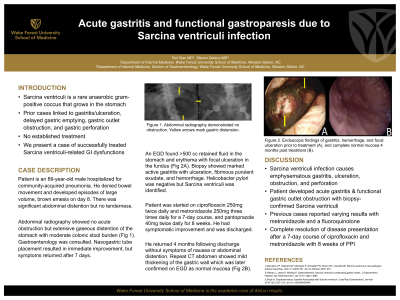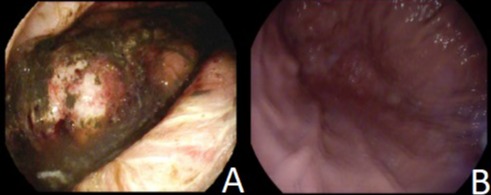Back


Poster Session E - Tuesday Afternoon
Category: Stomach
E0722 - Acute Gastritis and Functional Gastroparesis Due to Sarcina ventriculi Infection
Tuesday, October 25, 2022
3:00 PM – 5:00 PM ET
Location: Crown Ballroom

Has Audio

Ted G. Xiao, MS, MD
Atrium Health Wake Forest Baptist
Winston-Salem, NC
Presenting Author(s)
Ted G. Xiao, MS, MD, Steven Delaney, MD
Atrium Health Wake Forest Baptist, Winston-Salem, NC
Introduction: Sarcina ventriculi is a rare anaerobic gram-positive coccus that grows in a tetrad arrangement in the stomach. Its pathogenicity is poorly understood in humans. Limited prior case reports link associations with various clinical presentations including gastritis, ulceration, delayed gastric emptying, gastric outlet obstruction, and gastric perforation. There is no established treatment for symptomatic patients. We present a case of successfully treated Sarcina ventriculi-related acute gastritis and delayed gastric emptying.
Case Description/Methods: Patient is an 89-year-old male hospitalized and treated for community-acquired pneumonia. On day 8, he developed episodes of large volume, brown emesis. He denied any bowel movement since admission but was passing flatus. There was significant abdominal distention but no tenderness on exam. Abdominal radiography showed no acute obstruction but extensive gaseous distention of the stomach along with moderate colonic stool burden.
Gastroenterology was consulted. Nasogastric tube placement resulted in immediate improvement, but symptoms returned in 7 days. As a result, an EGD was performed, which was significant for >500 cc retained fluid in the stomach and erythema with ulceration in the fundus. A focal area of ulcerated mucosa was biopsied, and the pathology report showed marked active gastritis with ulceration, fibrinous purulent exudate, and hemorrhage. Helicobacter pylori was negative but Sarcina ventriculi was identified. Patient was started on ciprofloxacin 250mg twice daily and metronidazole 250mg three times daily for a 7-day course, and pantoprazole 40mg twice daily for 6-8 weeks. He had symptomatic improvement and was discharged.
He returned 4 months following discharge without symptoms of nausea or abdominal distention. Repeat CT abdomen showed mild thickening of the gastric wall which was later confirmed on EGD as normal mucosa.
Discussion: Previous cases have reported that Sarcina ventriculi infection leads to serious complications such as emphysematous gastritis, ulceration, obstruction, and perforation. Our case showed a patient developing acute gastritis and functional gastric outlet obstruction with biopsy-confirmed Sarcina ventriculi. Per review of previous cases, treatment with a combination of metronidazole and fluoroquinolone has been used with varying results. Our case shows an acute presentation of the disease with complete resolution after a 7-day course of ciprofloxacin and metronidazole.

Disclosures:
Ted G. Xiao, MS, MD, Steven Delaney, MD. E0722 - Acute Gastritis and Functional Gastroparesis Due to Sarcina ventriculi Infection, ACG 2022 Annual Scientific Meeting Abstracts. Charlotte, NC: American College of Gastroenterology.
Atrium Health Wake Forest Baptist, Winston-Salem, NC
Introduction: Sarcina ventriculi is a rare anaerobic gram-positive coccus that grows in a tetrad arrangement in the stomach. Its pathogenicity is poorly understood in humans. Limited prior case reports link associations with various clinical presentations including gastritis, ulceration, delayed gastric emptying, gastric outlet obstruction, and gastric perforation. There is no established treatment for symptomatic patients. We present a case of successfully treated Sarcina ventriculi-related acute gastritis and delayed gastric emptying.
Case Description/Methods: Patient is an 89-year-old male hospitalized and treated for community-acquired pneumonia. On day 8, he developed episodes of large volume, brown emesis. He denied any bowel movement since admission but was passing flatus. There was significant abdominal distention but no tenderness on exam. Abdominal radiography showed no acute obstruction but extensive gaseous distention of the stomach along with moderate colonic stool burden.
Gastroenterology was consulted. Nasogastric tube placement resulted in immediate improvement, but symptoms returned in 7 days. As a result, an EGD was performed, which was significant for >500 cc retained fluid in the stomach and erythema with ulceration in the fundus. A focal area of ulcerated mucosa was biopsied, and the pathology report showed marked active gastritis with ulceration, fibrinous purulent exudate, and hemorrhage. Helicobacter pylori was negative but Sarcina ventriculi was identified. Patient was started on ciprofloxacin 250mg twice daily and metronidazole 250mg three times daily for a 7-day course, and pantoprazole 40mg twice daily for 6-8 weeks. He had symptomatic improvement and was discharged.
He returned 4 months following discharge without symptoms of nausea or abdominal distention. Repeat CT abdomen showed mild thickening of the gastric wall which was later confirmed on EGD as normal mucosa.
Discussion: Previous cases have reported that Sarcina ventriculi infection leads to serious complications such as emphysematous gastritis, ulceration, obstruction, and perforation. Our case showed a patient developing acute gastritis and functional gastric outlet obstruction with biopsy-confirmed Sarcina ventriculi. Per review of previous cases, treatment with a combination of metronidazole and fluoroquinolone has been used with varying results. Our case shows an acute presentation of the disease with complete resolution after a 7-day course of ciprofloxacin and metronidazole.

Figure: Figure 1. A. Initial EGD showed severe gastric ulceration in the fundus. B. Repeat EGD after antimicrobial and PPI treatment showed normal mucosa in the stomach and pylorus.
Disclosures:
Ted Xiao indicated no relevant financial relationships.
Steven Delaney indicated no relevant financial relationships.
Ted G. Xiao, MS, MD, Steven Delaney, MD. E0722 - Acute Gastritis and Functional Gastroparesis Due to Sarcina ventriculi Infection, ACG 2022 Annual Scientific Meeting Abstracts. Charlotte, NC: American College of Gastroenterology.
